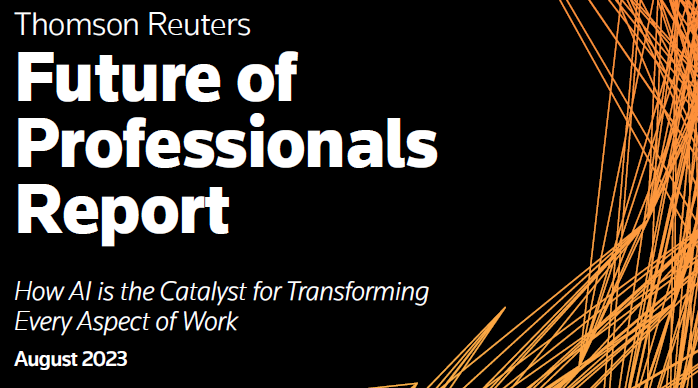Thomson Reuters Future of Professionals Report: Top Takeaways for the Legal Market

Improving productivity, driving law firm profitability, and providing high-quality advice to clients are among the top motivators for legal professionals to embrace AI, including generative AI. These are among the findings of the Future of Professionals Report, which surveyed more than 1,200 professionals in legal, tax and accounting, global trade, and risk and compliance industries.
Legal Current shares top takeaways from the report for legal professionals, including opportunities generative AI presents as well as concerns with the emerging technology.
- Legal professionals expect AI to improve productivity. Productivity is a top priority for legal professionals, and improved productivity was ranked as the biggest positive effect of AI. This finding follows the Q2 2023 Thomson Reuters Law Firm Financial Index, which noted the legal industry faces ongoing productivity challenges; firm productivity dropped in Q2, though it was less severe than in previous quarters. The Future of Professionals Report showed 38% of professionals anticipate AI giving them more time and mental bandwidth for higher-level tasks. It’s a key benefit considering that 67% of professionals rated “producing high-quality advice” as a strong motivator in their work.
- Law firms see AI as an opportunity for increased revenue. More than half (55%) of legal professionals predict that using AI will lower costs for firms and drive greater firm profitability. AI also may lead to greater use of alternative pricing models as it challenges law firms’ traditional billable-hours model. With AI automating some legal tasks, legal professionals will have more time to devote to higher-value work, such as strengthening client relationships and business development – which could, in turn, increase firm profitability.
- AI may be a threat to law firms that don’t embrace it. The report found 82% of professionals expect AI to lead to new services in the next five years, and 66% believe AI will create new career paths. While AI could lead to some job cuts in the legal industry, it will also present opportunities for individuals to learn new skills – from coding to math – that can help firm drive efficiencies. Law firms that embrace new technologies – and legal professionals who learn new skills to adapt – will be best positioned to use AI to drive and sustain growth.
- Law firms may need to increase investment in technology and training. Law firms have a reputation as slow to change, yet clients and law departments alike increasingly expect their firms to use technology – specifically to reduce costs. Clients are increasingly willing to move work to high-quality but more cost-effective outside counsel, according to the 2023 Report on the State of the Legal Market. Client demand may encourage firms to overcome any fears of AI’s learning curve and demonstrate their leadership in implementing technologies to drive efficiencies – internally and for their clients.
- Risk and regulation continue to be areas of concern. Professionals’ biggest fears around AI outputs include accuracy (25% overall; 30% for legal professionals), data security (15%), and ethics (15%). To help address these concerns, 93% of professionals believe that regulations to govern professional ethics of AI are necessary. The Future of Professionals report noted both the need for humans to be involved with AI and as well as the creation and implementation of AI guardrails – backed by a globally aligned, cross-industry regulatory framework.
For more insights, download the report.